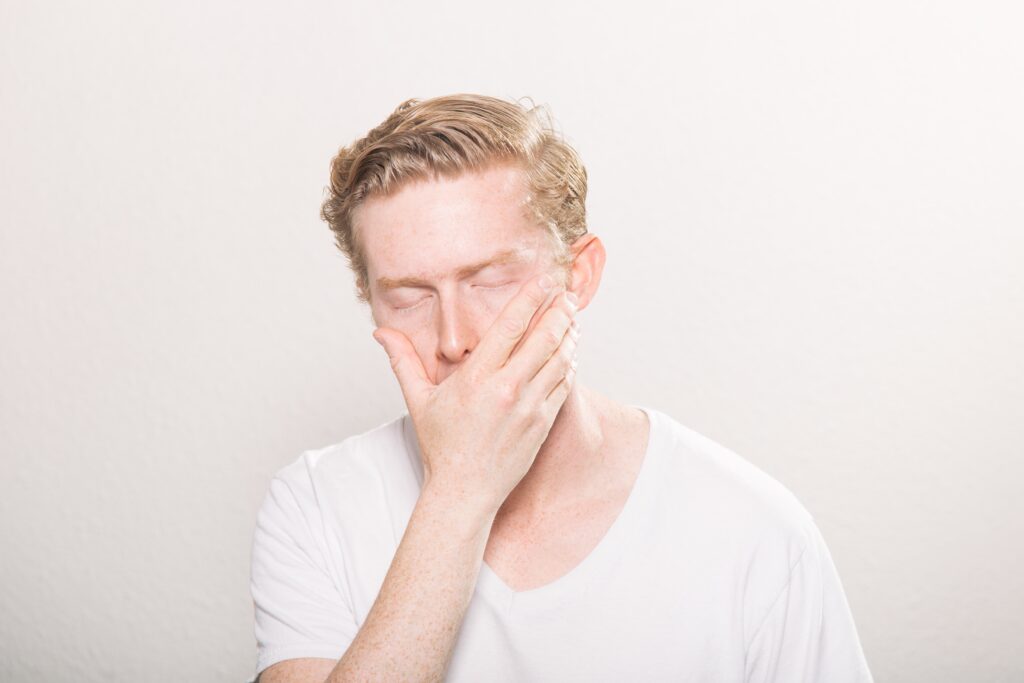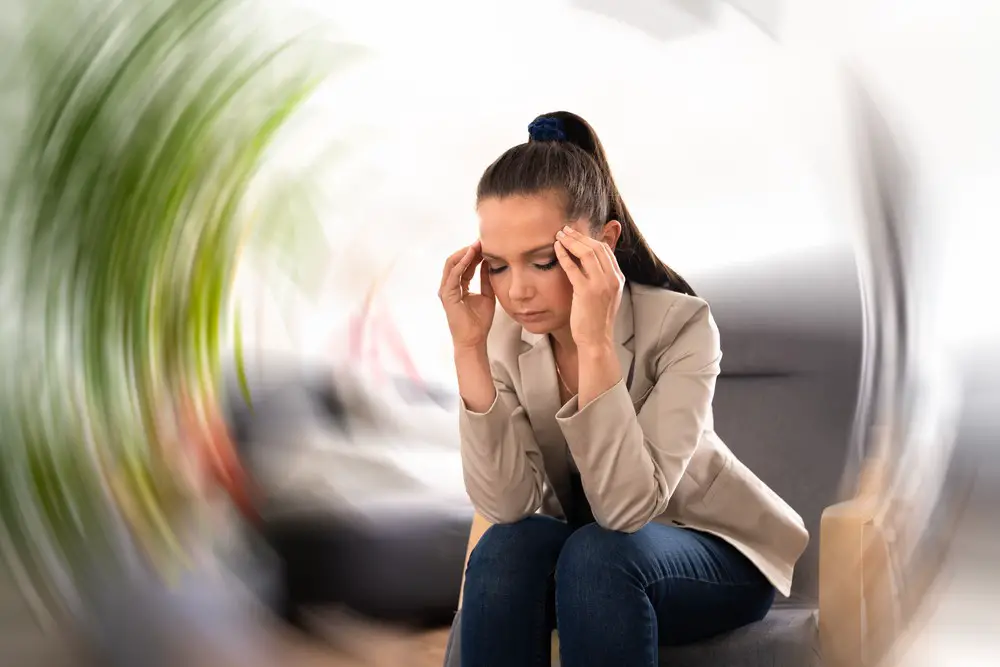As a BetterHelp affiliate, we receive compensation from BetterHelp if you purchase products or services through the links provided
Do you have trouble sleeping because of vertigo? If so, you’re not alone. Vertigo can be a very disruptive condition that makes it difficult to get a good night’s sleep. In this article, we will discuss some tips for getting a good night’s sleep when you are dealing with vertigo. We will also provide some helpful advice on how to reduce the symptoms of vertigo.
What Is Vertigo?
Vertigo is a condition that causes a person to feel as if they are spinning or moving even when they are not. This can lead to nausea, vomiting, and a feeling of unsteadiness. Vertigo can be caused by various things, including inner ear infections, head injuries, or migraines.

The Connection Between Sleep Apnea And Vertigo
There is a strong connection between sleep apnea and vertigo. Sleep apnea is a condition that causes a person to stop breathing for short periods during the night. This can lead to a decrease in oxygen levels in the blood and an increase in carbon dioxide levels. These changes can trigger vertigo.
What Causes Vertigo?
Many different things can cause vertigo. As we mentioned, it can be caused by inner ear infections, head injuries, or migraines. It can also be caused by a condition called Meniere’s disease. This disorder of the inner ear rocks can cause hearing loss, vertigo, and tinnitus (ringing in the ears).
Benign Paroxysmal Positional Vertigo:
This is the most common type of vertigo. A problem with the inner ear causes it. It can be triggered by changes in head position, such as when you turn over in bed or get up from a lying down position.
Migraine-Associated Vertigo:
This type of vertigo is associated with migraines. It can cause intense, throbbing headaches and dizziness.
Labyrinthitis:
This inner ear infection can cause vertigo, hearing loss, and tinnitus.
Acoustic Neuroma:
This non-cancerous tumor grows on the nerve that connects the inner ear to the brain. It can cause vertigo, hearing loss, and balance problems.

Symptoms Of Vertigo
The symptoms of vertigo can vary from person to person. Vertigo sufferers may only feel dizzy, while others may feel like they are spinning or moving even when they are not. Symptoms can also include nausea, vomiting, and a feeling of unsteadiness which trigger a vertigo attack. Meniere’s disease BPPV, Labyrinthitis, and vestibular neuritis also trigger mild to severe vertigo attacks.
Treatment Of Vertigo
There are several different treatments for vertigo. These include vestibular rehabilitation, medications, and surgery.
Vestibular Rehabilitation:
This is a type of therapy that can help to retrain the brain and improve balance.
Canalith Repositioning Maneuvers:
These are a series of exercises that can help to move the particles out of the inner ear and improve symptoms.
Medications:
Several different types of medications can be used to treat vertigo. These include anti-nausea drugs, anti-vertigo medications, and corticosteroids.
Surgery:
In some cases, surgery may be necessary to correct the underlying cause of vertigo. For example, this could involve removing a tumor or correcting a problem with the inner ear.

Tips For Sleeping With Vertigo
If you are dealing with vertigo, there are some things you can do to help make it easier to sleep. Here are a few tips:
Avoid Eating Spicy Food:
Spicy food can trigger vertigo symptoms and make them worse.
Avoid Caffeine:
Caffeine can make vertigo worse and make it more difficult to sleep.
Avoid Alcohol:
Alcohol can make vertigo symptoms worse. It can also make you feel drowsy, making it difficult to sleep.
Breathing Exercises And Meditation:
Breathing exercises and meditation can help to relax the body and mind. This can make it easier to fall asleep.
Get Up Slowly:
Getting up too quickly can trigger vertigo symptoms. When you get out of bed, sit on the edge of the bed for a few minutes before standing up.
Sleep On Your Back:
This will help to keep your head in a neutral position and reduce the chances of triggering vertigo symptoms.
Use Extra Pillows:
Using a wedge pillow with your head elevated can help to prop up your head and reduce the pressure on your inner ear. This can help to relieve vertigo symptoms.
Wear Loose-Fitting Clothing:
Tight-fitting clothing can put pressure on your inner ear and trigger vertigo symptoms. Wearing loose-fitting clothing will help to reduce the pressure on your inner ear and make it easier to sleep.
Sleeping Position:
The best sleeping position for vertigo is on your back with your head propped up on pillows. This will help to keep your head in a neutral position and reduce the pressure on your inner ear.
Head Positioning:
When you sleep, it is essential to keep your head in a neutral position. This means your head should not be tilted or turned to one side. Keeping your head in a neutral position will help to reduce the pressure on your inner ear and reduce vertigo symptoms.
Use Higher Pillows:
If you are having trouble sleeping with vertigo, try using higher pillows. This will help to keep your head in a neutral position and reduce the pressure on your inner ear.
Change Your Diet:
Certain foods can trigger vertigo symptoms and make them worse. Avoiding these trigger foods can help to reduce the severity of your symptoms.
Some trigger foods include caffeine, alcohol, spicy food, chocolate, and citrus fruits.
Avoid Bright Lights:
Bright lights can trigger vertigo symptoms and make them worse. If you have trouble sleeping with vertigo, try turning off the lights or wearing a sleep mask.
Medications And Supplements:
Several different types of medications and supplements can help to treat vertigo. Some of these include vestibular suppressants, anti-nausea medication, and ginger.
Vestibular Suppressants:
Vestibular suppressants can help to reduce the symptoms of vertigo. These medications work by decreasing the activity of the vestibular system.
Anti-Nausea Medication:
Anti-nausea medication can help to relieve nausea and vomiting associated with vertigo.
Final Thoughts
Vertigo can be a debilitating condition that makes it difficult to function in everyday life. However, there are treatments available that can help to improve symptoms and make it easier to cope with the condition. If you are dealing with vertigo, talk to your doctor about the treatment options that are available to you.
Articles You Might Enjoy Reading
Why You Should Lower The Thermostat In Your Bedroom if You Want to Sleep Better
The Effects of Cold Therapy On Your Mind – Can It Help You Reduce Stress?
How to Sleep With a Cast on Leg
CalmiGo Anxiousness & Stress-Relief Natural Calming Device
11 Best Apps with Guided Meditations that Can Help You Relax Your Mind
- Left Arm Pain and Anxiety: Understanding the Relationship - November 23, 2023
- Anxiety Paralysis: Coping with Overwhelming Stress - November 23, 2023
- Anxious vs. Nervous: Differentiating Emotions and Responses - November 15, 2023
This site contains affiliate links to products. We will receive a commission for purchases made through these links.



